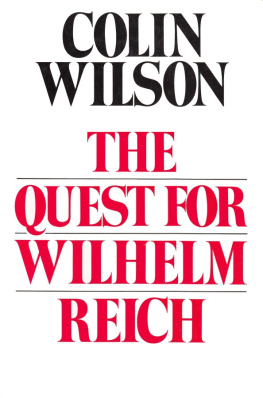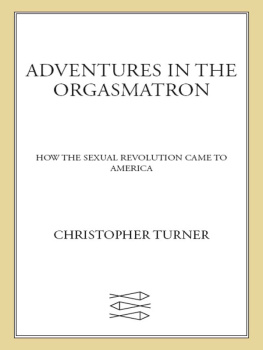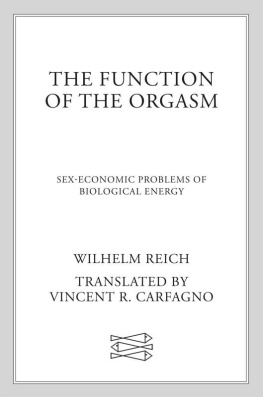Analytical Table of Contents
Prefatory Note
Acknowledgments
Introduction
The downfall of Wilhelm Reich. Reichs denunciations of his enemies. Emotional plague. Reichs susceptibility to prejudice. Martin Gardners ditto. Reichs vitalism; his views on cancer. Suppose he was right? Reich: the materialist who became a mystic. Van Vogts Right Man theory. Reichs increasing paranoia. His pathological jealousy. Anticipations of Reichs orgone energy theory, Mesmer, Reichenbach, Harold Burr. Kirlian photography. I meet Robert Ollendorff. The orgone box. How Reich invented it. Ollendorffs career. Constance Rooth-Tracey. Reichs breathing therapy. I meet Ilse Reich. Why the marriage broke down. A. S. Neill on Reich. Reich or the murder of Jesus; loopholes in his theory. Reichs self-deception. The Shakespearian tragedy of his life, Human personality and impersonality. Yin and yang, Beethoven. Poe. Reichs shrill self-assertion. Reich and Einstein. Reichs mistakes. Freud and the sexual theory.
Chapter One
Austria under the Habsburgs. The Badeni Ordinance: The German-Austrian revolt. The beginning of the end of the Empire. Reichs childhood. His father and mother. His mothers infidelity and suicide. Death of Reichs father. Loss of the farm. Reichs army period. Studern years in Vienna. Medical student. The course in sexology Hischfeld and Havelock Ellis. Krafft-Ebing. Sexual deviations. His first reaction to Freudianism. The libidoReichs vitalism. Freuds pragmatism. Reich visits Freud. Reichs later opinion of Freud: not a genitally healthy man.
Chapter Two
The history of psychoanalysis. Pre-Freudian views: mental diseases are brain diseases. Beard and neurasthenia. The Puysgurs and hypnosis. Bernheim. Charcot and hypnosis. Axel Munthe on Charcot. Freud studies with Charcot. Breuer and Bertha Pappenheim. The power of the unconscious mind. Freuds basic error: failure to recognize the feedback mechanism. The ego is the puppet of the id. What is the unconscious? The mechanism of neurosis: the feedback effect. Freud and Maslow. Viktor Frankl and the prisoners from Auschwitz. Powers of the unconscious: Coleridge and the illiterate who spoke Latin. Jean Houston and the man who conversed with Socrates. Jung causes a poltergeist effect. Freud abandons the libido and invents the death instinct. Reichs fundamental optimism. How the sexual theory came about: Breuer and Anna O. The case of Little Hans. Freud and the Wolf Man. What Freud suppressed in his paper. Freuds paranoid bitterness about Adler. Freud and Jung. Freud and Thomas Mann. Karl Kraus. Viktor Tausk. Tausks suicide.
Chapter Three
Reich on Freud. The Freud circle in Vienna. Federn, Hitschmann, Nunberg, Rank, Silberer, Ferenczi. Suicide of Silberer. Reichs self-assurance. His unpopularity among Freuds older followers. Reichs Peer Gynt paper; his denial of free will, the weakness that would destroy him. Reich casts himself as the misunderstood martyr. Reich becomes a member of the Vienna Psychoanalytic Society. Sadgers lack of tact. Federn begins to dislike Reich. The aggressive, paranoid and ambitious type. Why Reich broke off three training analyses. Reich and the sexual theory. Reich teaches his patients to masturbate. Case of the impotent waiter. Actual neurosis. The orgasm theory. Reich marries. His work under Wagner-Jauregg. Reichs interest in psychotic patients: could they be right after all? Reichs optimism. Freud invents the super-ego. Reich rejects it. The technical seminardesigned to keep Reich out of mischief. Death of Reichs brother Robert. Reichs first paper on genitality; its cool reception. Reichs conviction that patients harbour hostility to the psychotherapist. The Function of the Orgasm: Freuds lack of enthusiasm. The problem of resistance. Freuds disagreement. Freud as Reichs father-substitute. Reichs loyalty to Freud. His rationalization of Freuds rejection. Freud refuses to psychoanalyse Reich. Reichs breakdown. His deterioration. Federn slanders Reich. Reichs affairs with patients. Freuds narrow-mindedness. Reichs return from the sanatorium.
Chapter Four
Was Reichs life work based on a fallacy? Freuds theory of neurosis. Neurasthenic patients. Frankls law of reverse effort. The evolutionary view of psychology Freuds obsession with being scientific. Reichs cases of cardiac neurosis. Polanyi and the problem of alienation. Split-brain research. The right and left hemispheres. Soeirvs work with epileptics. The ego as the left hemisphere, the id as the right. Neurosis as failure of synchronization between left and right. Absurdity. The feedback effect. The left is always in a hurry. Stage fright. T. E. Lawrence as an example of left-brain domination. Role of the right hemisphere: to add depth to reality. Lady Chatterley and the orgasm. Reichs sexual theory a a partial recognition of the truth about right and left. Th evolutionary possibilities of a closer cooperation of left and right. Slowing down the left or speeding up the right. Reichs variant of the sexual theory. Mechanism of neurosis.
Chapter Five
Reichs return to Vienna from Davos. The killings at Schattendorff. The killers are acquitted; riots. Reichs sympathy with the left. Reichs working-class patient. Reichs conversion to Marxism. Psychoanalysis as bourgeois thinking. Dialectical Materialism and Psychoanalysis. Reich joins the Communist Party. The ideal society. The compulsory sex morality. Malinowskis Trobrianders. Are Reichs views borne out by modern permissive societies? Human perverseness. To be free is nothing; to become free is heavenly. Reich attempts to justify psychoanalysis to the Marxists. Reich goes to Moscow. Increasing hostility of the Freud circle. Freuds political views. Reichs lecture on blockage. Freuds reaction: Civilization and Its Discontents. Freud abandons the sexual theory. Reich disagrees. Reich and the defensive mechanism of patients. Methods to pinpoint resistances. Reichs new technique of character analysis. Provoking the patients hostility. The impotent patient: Reichs analysis. How would Maslow or Frankl have treated the case? Reichs psychoanalysis as a battle of wills. Another hostile patient. The English lord. Freuds increasing impatience. Reich as Communist agitator. He decides to go to Berlin. Initial success there. The Red Block cell. Koestlers description of the cell. Reichs attempt to combine sexual reform and Communism. Success of Association for Sexual Politics. Why the Communists rejected Reich: their feeling that he was decadent. Reichs quarrels with Bischoff and Schneider. The Mass Psychology of Fascism. Breakdown of his marriage. The Reichstag fire. The German Communists are suppressed. Reich is attacked in Nazi press. He escapes back to Vienna.
Chapter Six
The quarrel with Freud; Freud refuses to publish Character Analysis. Federn forbids Reich to lecture. Reich decides to go to Copenhagen. Reichs opportunism. Analysis of his miscalculations. His determination to compromise. Reich was basically an authoritarian elitist. Arrival in Copenhagen; feelers to Rado in New York. Publication of Mass Psychology of Fascism. Problem with Danish authorities. Freud declines support. Move to Malm. Trip to London. What is Class-Consciousness? European tour. Expulsion from Sweden. Summer in Sletten. 13th Psychoanalytical Congress: Reichs expulsion. The Oslo period. Electric currents of the body. Readiness potential. The breakthrough into the biological realm. Masochism: the desire to burst. Muscular armour. Orson Beans description of treatment. Elsworth Baker: Man in the Trap. Abreaction therapy: persuading patients to relive experience. William Sargant. The Freud of Oslo. Fenichels defection. Rumours of Reichs insanity. The discovery of bions. The T-bacilli. Bion research. Reich and Gerd Berger sen. Reichs orgasm theories anger the Norwegians. Scandal. The attacks SAPA bions and free orgone energy. Reich sails to New York.





